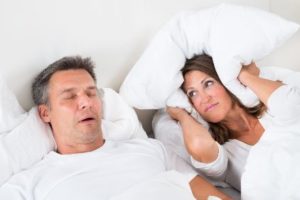 Did you know that at the age of 75 a person has spent an estimated 25 years of their life asleep? That’s right, about 1/3 of our lives is spent sleeping! It’s a good thing, too, since sleep has so many wonderful benefits for our mental and physical health. But what if you have poor sleep quality, or even sleep apnea, where your airway is obstructed and your breathing is disrupted? And the real question is: how would you know? It sounds obvious, but sleep apnea is hard to address because you have no way of knowing what happens while you sleep. To shed a little light on the situation, we’ll discuss seven signs that you may have sleep apnea in Lincoln. If you have some of these symptoms, it’s important to schedule an evaluation so you can get a diagnosis and learn about treatment options.
Did you know that at the age of 75 a person has spent an estimated 25 years of their life asleep? That’s right, about 1/3 of our lives is spent sleeping! It’s a good thing, too, since sleep has so many wonderful benefits for our mental and physical health. But what if you have poor sleep quality, or even sleep apnea, where your airway is obstructed and your breathing is disrupted? And the real question is: how would you know? It sounds obvious, but sleep apnea is hard to address because you have no way of knowing what happens while you sleep. To shed a little light on the situation, we’ll discuss seven signs that you may have sleep apnea in Lincoln. If you have some of these symptoms, it’s important to schedule an evaluation so you can get a diagnosis and learn about treatment options.
Headaches
Disruptions in sleep can reduce the amount of time spent in REM, an important cycle of sleep in which your body gets deep rest and relaxation. Missing out on this cycle may cause headaches, either upon waking or throughout the day.
In fact, researchers also think there may be a link between sleep apnea and migraines.
Trouble Concentrating
Quality sleep helps the brain function at its best! Staying clear and focused without it can be a challenge and can affect both your professional and personal life.
Dry Mouth or Sore Throat
The soft tissues of the mouth and throat need to stay moist in order to feel comfortable. With sleep apnea, the mouth typically stays open throughout the night, drying out the tissues and resulting in a scratchy or sore throat.
Mood Changes
Sleep is crucial for our mental and emotional health. In the same way a child gets grumpy if they haven’t had a nap, adults also get grumpy without good quality sleep! If you feel moody or struggle with anxiety or depression, sleep apnea may be a factor.
Waking up or Gasping
If you ever find yourself waking up in a panic or suddenly gasping for air at night, it’s a sign your body may be reacting to a lack of oxygen.
Snoring
Snoring is often noticed first by someone’s partner, but in some cases it can be so loud that it wakes up the person doing it!
Daytime Fatigue
Not only can sleep apnea affect your health, it can also put you at a greater risk of accidents. Some people with this condition fall asleep during the day, which is obviously very dangerous while driving or operating machinery.
Treatment
If you get a diagnosis of sleep apnea, you’ll be glad to know that there are treatment options other than a CPAP mask, which many people find uncomfortable. We can provide oral appliance therapy – a less invasive, but still effective treatment to help you get the sleep and overall quality of life that you deserve!
About the Author
Dr. Louis Olberding is an award-winning general, cosmetic and restorative dentist who takes a particular interest in sleep apnea. He knows the positive impact that a good night’s sleep can have on his patients and loves being able to offer treatment alternatives for this condition. He can be reached for questions through his website or at (402) 488 – 2325.
